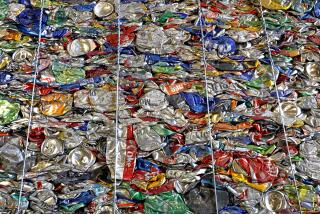Las Vegas, hoping to stem HIV and hepatitis, to get needle vending machines
Reporting from Las Vegas — Las Vegas is preparing to be the first city in the nation with vending machines dispensing clean needles in an effort to help combat the spread of hepatitis B, hepatitis C and HIV, while also possibly leading some drug users into treatment.
Three machines will be available for users starting in May. The pilot program is a coordinated effort between Trac-B Exchange, the Southern Nevada Health District and the Nevada AIDS Research and Education Society to discourage the sharing of needles among users.
Trac-B Exchange program director Rick Reich said that to participate in the vending machine program, users would have to fill out a form for the sponsoring groups and obtain an eight-digit identification number to ensure confidentiality and track their use. Each kit will contain sterile syringes and needles — along with a compartment for used needles that can be disposed of safely at the machines.
But unlike snack, soda or movie rental machines left in open spaces, these $15,000 machines will be located inside the three facilities and would be accessed only during the hours the buildings are open for business. Reich said the cost of each kit was under $10, but they would be free for users.
Reich said putting one of the vending machines inside the Community Counseling Center of Southern Nevada was designed to allow some drug abusers to interact with trained counselors if they decided they wanted to get help.
Patrick Bozarth, executive director of the counseling center, said his staff had been undergoing training in anticipation of reaching drug abusers who may use the vending machine and learn about treatment options.
“I think we’re optimistic it will help,” Bozarth said. “But it’s such a new program and we want to make sure we’re prepared.”
Needle exchange programs have been used successfully throughout the world, with several nations adopting vending machine technology into their mix to curb the spread of blood-borne pathogens.
The U.S. Centers for Disease Control and Prevention has reported the effectiveness of needle exchange programs, and the North American Needle Exchange Network counts 228 syringe service programs in 35 states, Washington, D.C., and Puerto Rico.
The CDC reported on a study that looked at the effects of New York’s exchange program on the prevalence of hepatitis C infection between 1990 and 2001, and found the needle exchange program reduced the disease’s prevalence from 80% to 59% among intravenous drug users.
Needle and syringe possession was illegal in Nevada up until 2013, when the state Legislature repealed the law. Pharmacies can sell needles and syringes but have discretion about who can purchase them.
Reich said the machines helped remove some of the stigma faced by users who felt uncomfortable during transactions with pharmacists — some of whom may question why the syringe and needle are needed.
“Vending machines are not born with a bias,” Reich said. “It doesn’t have a personality and doesn’t care how you look when you approach it.”
Vending machines are not born with a bias. It doesn’t have a personality and doesn’t care how you look when you approach it.
— Rick Reich, program director of Trac-B Exchange
Jenny Gratzke, disease investigator and intervention specialist with the Southern Nevada Health District, said there were an estimated 5,800 injection drug users in Clark County, a number she believed was low.
Most of the users, she said, are either injecting heroin or methamphetamine, with a smaller number shooting up cocaine. A small percentage of needle users, she said, are transgender people using hormones or steroids.
Gratzke said she hoped users took advantage of the vending machines, but she acknowledged the initial rollout faced some challenges.
“It does take time to gain the trust of the community,” she said. “The people who are injecting the drugs have been stigmatized, and so I think they may be a little hesitant initially. But once it catches on, I think it will be beneficial for everyone involved.”
Twitter: @davemontero
Click here for a Spanish version of this story
ALSO
This company is trying to draw Chinese tourists to L.A. — with VR technology
L.A. responds to Trump travel ban with ‘Everyone is welcome’ campaign
More to Read
Sign up for Essential California
The most important California stories and recommendations in your inbox every morning.
You may occasionally receive promotional content from the Los Angeles Times.











